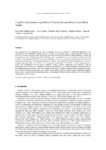Cognitive impairment as predictor of functional dependence in an elderly sample

Use this link to cite
http://hdl.handle.net/2183/14236Collections
- Investigación (FCS) [1293]
Metadata
Show full item recordTitle
Cognitive impairment as predictor of functional dependence in an elderly sampleAuthor(s)
Date
2011-03-11Citation
Millán-Calenti JC, Tubío J, Pita-Fernández S, Rochette S, Lorenzo T, Maseda A. Cognitive impairment as predictor of functional dependence in an elderly sample. Arch Gerontol Geriatr. 2012 Jan-Feb;54(1):197-201.
Abstract
[Abstract] This retrospective study determines the role of cognitive decline as a predictor of functional dependence.
In a representative 600 community-dwellers aged 65 or older, we examined using a logistic regression
model, the association between cognitive status (taking into account age and educational level) and
dependence on basic and instrumental activities of daily living (ADL and IADL, resp.), controlling for
socio-demographic variables and health conditions. The Mini-Mental State Examination (MMSE) scores
were compared in participants with functional disability to perform basic and instrumental activities.
Cognitive status influenced functional dependence on activities of daily living, basic (OR = 4.1,
95%CI = 2.7–6.1) and instrumental (OR = 5.7, 95%CI = 3.5–9.3), independently of gender, age, educational
level and health conditions. Besides, cognitive impairment was associated with the dependence on
certain basic (e.g., bathing, toileting) and instrumental (e.g., using the telephone, taking medications, and
handling finances) activities. This was a gradual relationship, the highest cognitive decline implied the
highest loss of ability at carrying out activities, with a larger impact on basic activities. These findings
suggest that cognitive decline can be a predictor for functional dependence, independently of other
variables, and turn into a very useful tool indicating the need for support.
Keywords
Cognitive impairment
Dependence of elderly
Functional disability
Dependence of elderly
Functional disability





